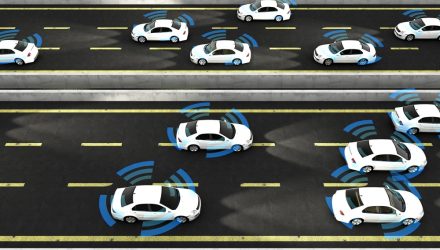Self-driving vehicles aren’t on the roads in everyday, significant fashion as of yet, but the technology is advancing at a rapid rate. With that, there are potentially substantial, long-ranging investment implications to be evaluated. Exchange traded funds make that objective easier, and the ARK Autonomous Technology & Robotics ETF (ARKQ) is arguably among the most relevant when it comes to self-driving exposure. ARKQ’s 13.52% weight to Tesla (NASDAQ: TSLA) — a self-driving leader — puts the ETF’s front and center when it comes to the investable side of the burgeoning autonomous transportation industry.
To be sure, self-driving isn’t a perfect technology. It’s flawed in harsh weather conditions, and drivers may opt to disengage a related platform in other high-risk driving scenarios. Still, that segment was a point of emphasis at Tesla’s recent investor day. Notably, it appears as though Elon Musk’s electric vehicle behemoth is making important self-driving strides.
“During its Investor Day, for the first time Tesla disclosed the accident rate of its Full Self-Driving (FSD) system: one accident per 3.2 million miles, which is more than six times safer than the national average of one per ~500,000 miles,” noted ARK Investment analyst Tasha Keeney. “That said, until its recent update, v11.3, the FSD beta software stack applied only to surface, or city streets. Surface streets have a higher accident rate than highways, as they represent ~30% of miles driven but 75% of crashes.”
One way of looking at the above is that the primary allure of advancing self-driving technology isn’t so drivers can sit their vehicles with their hands off the wheel doing nothing. Rather, the emphasis is safety, meaning that if companies such as Tesla can prove to regulators that self-driving technology improves safety, the concept could enjoy wider mainstream adoption. If that happens, the investment benefits could be significant.
Of note to ARKQ investors and those considering the exchange traded fund, Tesla is arguing for broader deployment of full self-driving technology.
“To evaluate the incremental safety of FSD, an apples-to-apples comparison would be against a manually driven Tesla. Adjusting to surface street specific accident rates, compared to the ‘non-Autopilot’ accident rate in Tesla’s safety report, FSD-equipped cars appear to be ~5X safer than manually driven Tesla cars and 18X safer than the average car in the US,” added ARK’s Keeney.
For more news, information, and analysis, visit the Disruptive Technology Channel.
The opinions and forecasts expressed herein are solely those of Tom Lydon, and may not actually come to pass. Information on this site should not be used or construed as an offer to sell, a solicitation of an offer to buy, or a recommendation for any product.

